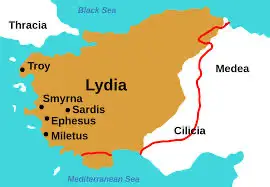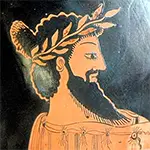The Lydians
The ancient kingdom of Lydia thrived in what is now Turkey for a couple of centuries before the coming of Persia, Macedon, and Rome. 
The name comes, historians say, from the first king, Lydus. (An older, Greek name was Maionia.) The land was known for producing items from leather and textiles and for being a major trade center, helped by its geography. The capital city, Sardis, was a very wealthy city indeed. The height of Lydian power was in the 7th and 6th Centuries B.C. The first famous King of Lydia was Gyges, the founder of the Mermnad dynasty that ruled the kingdom for most of its prominence. Gyges led an army that overthrew the neighboring powers the Cimmerians and the Phrygians and declared a kingdom with himself at the head. A few generations later came another famous king, Alyattes, who fought against several of his neighbors, including the Medes. It was Alyattes who was the king on the battlefield in 585 B.C. when the onset of a solar eclipse convince both armies to put down their arms and discuss peace. (The Median commander that day was King Cyaxares.) 
Alyattes was also the monarch who first commissioned the minting of metal coins as a means of currency. They were not circular but rather unshapen lumps, mostly of electrum, a gold-and-silver alloy, but sometimes of pure gold or silver. The gold came from the river Pactolus, secure within the kingdom's borders. To distinguish these coins, the Lydians stamped on them a depiction of a lion and an ox. 
The most famous Lydian king was its last one, Croesus, the son of Alyattes. He obtained enormous wealth and fame and was a friend to Greeks, alternately conquering some of their cities and offering money to help build the Temple of Artemis at Ephesus, one of the Seven Ancient Wonders of the World. Croesus is at the heart of a story from the Oracle at Delphi. As the story goes, the Oracle told Croesus that if he went to war, a great empire would fall and that he interpreted that to mean that he would defeat his enemies, the Persians. Cyrus the Great and his armies had the last laugh, however, defeating the Lydians and capturing Croesus himself in 546 B.C. The Persians absorbed Lydia into their empire and declared it a satrapy. Alexander the Great, a couple centuries later, was the next to conquer, taking over from Persia. One of his successors, Antigonus I, claimed the area for the Seleucid Empire. The final ancient conqueror of Lydia was Ancient Rome. Throughout all of these conquests, Sardis remained an important and wealthy place. The various conquerors retained its status as a regional capital, and it was on the Persian Royal Road. |
|
Social Studies for Kids
copyright 2002–2024
David White




